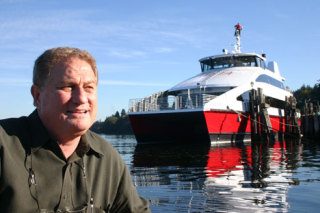Shipyard busy despite economy
LANGLEY — The first of four sleek twin-hull passenger ferries destined for the San Francisco Bay Area is being prepared for sea trials at the Langley marina.
Built by Nichols Brothers Boat Builders of Freeland, the $8.8 million catamaran “Gemini” was launched last week and towed to Langley for finishing work.
It is scheduled to be delivered to the Bay Area’s Water Emergency Transit Authority in December. WETA’s mission is to provide public aquatic commuter service throughout the Bay Area.
“This is our first boat,” Shirley Douglas, WETA spokeswoman, said Thursday from San Francisco. “We hope to put 10 vessels into service by the year 2025.”
Nichols Brothers is playing a big role in that objective. Construction of a second WETA catamaran already is underway at the Freeland boatyard, and two more have been ordered, said Matt Nichols, managing director for business development.
The next one is scheduled for delivery in March, and the other two for late next year, Douglas said. Two additional vessels are being discussed, if WETA can arrange for funding, she said.
Nichols Brothers has built 41 similar models of the Australian-design catamarans since 1982, Nichols said.
The Gemini is constructed entirely of aluminum and is loaded with sophisticated electronic and technical features, he said.
“It will be the most environmentally-friendly ferry on the bay,” Douglas said.
Nichols said a new catalytic converter system for the boat’s two 1,410 horsepower diesel engines ensures optimum efficiency while reducing exhaust emissions.
He said Gemini’s emissions are 60 percent below California requirements and 85 percent below 2007 Environmental Protection Agency standards.
As for waste, “nothing goes over the side of these vessels,” Nichols said. “It’s all processed aboard the ship and pumped out later.”
He said the twin-hull design creates a smoother ride than single-hulled vessels, while providing maximum speed and fuel efficiency, and a much smaller, less-disruptive wake.
“It has to be the greenest vessel in the world,” Nichols said.
The Gemini is 118 feet long and nearly 29 feet wide, and has a draft of a little more than five feet. It can carry 149 passengers and 34 bicycles, and has a VIP lounge on the upper deck.
It’s twin-hull design lets air flow between, providing lift and reducing drag.
“They’re like two knife edges in the water,” Nichols said. “We’re actually cheating physics.”
The craft is operated by a crew of three, and can cruise at 25 knots, or more than 37 miles per hour.
WETA’s first contract was in the works last year when financial woes forced layoffs and the eventual sale of Nichols Brothers to Ice Floe, based in Dallas, Texas.
“We have been very pleased that they have been able to keep to the schedule,” Douglas said.
“It was a pretty smooth transition,” Nichols said. “We’ve done work for the WETA in the past. They’re wonderful people.”
He said the acquisition left Nichols Brothers better financed and better structured.
“I think we’re stronger,” he said.
The troubles of a year ago are receding quickly for the company, which continues to add to its plate.
It’s preparing a bid to construct a portion of two new 64-car high-speed ferries for the Keystone-Port Townsend run.
Nichols Brothers, Todd Pacific Shipyards in Seattle and Everett Shipyards of Everett will bid jointly on the contracts to build the new ferries, slated for service in 2010, Nichols said.
He said bids on the $84.5 million project will be opened by state officials on Nov. 6, and the contracts are to be awarded within 10 days. The first vessel would go into service in April 2010, and the second later that fall, state officials say.
The contract contains an option for a third ferry, Nichols said.
Meanwhile, the company is midway through contracts to build five large tugboats. The $10-million tractor vessels are 100 feet long and weigh 85 tons.
The third and latest tug is undergoing sea trials at Langley marina, and is expected to be delivered soon to the Minette Bay Co., of Prince Rupert, B.C., Nichols said.
“The marine industry is very strong,” he said. “The weak dollar is a strength for us, and we’re trying to market worldwide.”



